Introduction
In the summer of 1998, Lisbon hosted the Exposição Internacional de Lisboa de 1998 , the International Exposition or Expo 98. The theme of the Expo was was “The Oceans: A Heritage for the Future”. The event coincided with the 500 year anniversary of Vasco da Gama’s voyage to India, which opened trade routes with the far east through the Atlantic Ocean. 143 countries were represented in the Expo. From May 22 through September 30, over 11 million people visited the event.
Expo 98 was held on a 50 hectare (125 acre) site of redeveloped land on the east side of Lisbon along the Tagus River. This area, called the Parque das Nações, or Park of Nations, is very different from the other parts of Lisbon that we have visited. Much of Lisbon is characterized by “Pombaline” architecture – named for the Marquês de Pombal, who oversaw the rebuilding of Lisbon after the 1755 earthquakes.
But the Parque das Nações is a modern area, with large, sleek buildings, open plazas, and interesting art installations.
During our recent stay in Lisbon, we explored the Parque das Nações. Here is some of what we saw.
A Brief History of the Parque das Nações
The Parque das Nações has some interesting history.
“The area had been landscaped in 1942 as a Hydroport, for docking the hydroplanes that crossed the Atlantic to and from the US. When the modern jet planes rendered the hydroplanes obsolete, the place became an industrial park of containers, polluting industries and slaughterhouses which had seen a growing degradation over the decades.”
In 1992, Lisbon made a successful bid to host Expo 98. Over the next few years, the area was redeveloped and many new buildings were built. A new metro line was constructed to link the city center with the Expo site.
All the buildings were pre-sold for later reuse after the Expo. This has allowed the Parque das Nações to continue as a vibrant area of entertainment and commerce, long after the Expo ended.
First Impressions of the Parque das Nações
The morning we walked through the Parque das Nações was one of the happiest mornings Mike has had in Portugal. It was sunny, the sky was clear, the air was cool, and there were lots of new things to see. (He’s still smiling as he edits this post and looks at the pictures.)
The night before, he had read about the area for several hours. As we walked through the park, he would point out each landmark and say something about it that he’d just learned. Mary said he was flinging knowledge at her like a wet dog shaking off his bath water. Now he gets to fling it on you.
We walked north from the marina on the Passeio de Neptuno, a wide pedestrian walkway. We passed the Teatro Camões – the Camões Theatre, home of the Lisbon Ballet Company. In the distance we could see the Vasco da Gama bridge. When it was built, it was the longest bridge in Europe – 17km or 10 1/2 miles. (That’s 3 1/2 miles longer than the Seven Mile Bridge in the Florida Keys on US Route 1 to Key West.)

Also in the distance was the Torre Vasco da Gama – the Vasco da Gama Tower. When it was built for the Expo, it was the tallest structure in Portugal at 145m / 476ft. Next to the tower is the 5-star Myriad hotel that was opened in 2012. A restaurant located in the observation deck at the top of the tower was closed in 2004. In 2018, the Spanish chef Martin Berasategui opened a new restaurant, Fifty Seconds. Within a year, it had been awarded a Michelin star – Berasategui’s 12th star.
Fifty Seconds is on our bucket list now.
The Telecabine Lisboa – the cable car – ran parallel to our path.
Touring The Oceanário
The Passeio dead ended in front of the Oceanário de Lisboa. We’ve seen several articles that insist that this is not an aquarium, it’s an oceanarium. We are unsure about the difference, but it is a fascinating facility.
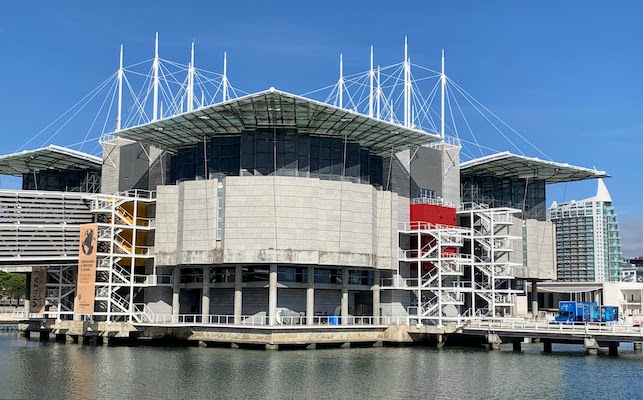
Inside is a massive central tank (5 million litres of water) with thousands of fish, sharks, rays, and other aquatic creatures. Surrounding the main tank are four outer tanks that represent four oceanic ecosystems – Antarctic, Pacific, Indian, and Atlantic. In those areas you can also see penguins, arctic birds, sea otters, and many varieties of undersea life, like sea anemones.
To get into the Oceanário you must pass by a fierce looking guard.
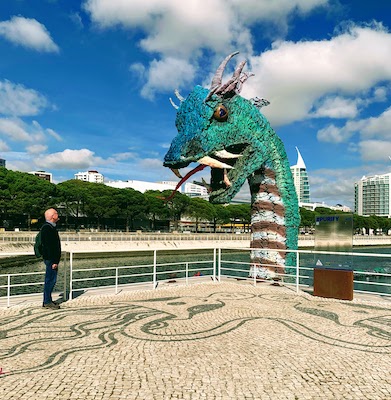
Luckily for us, he wasn’t hungry that morning.
We spent several hours touring the Oceanário and were fascinated by what we saw.
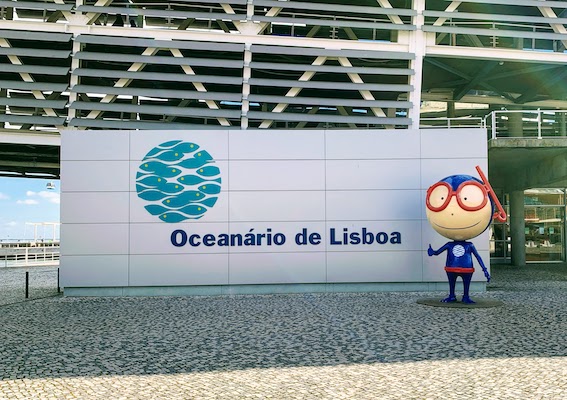
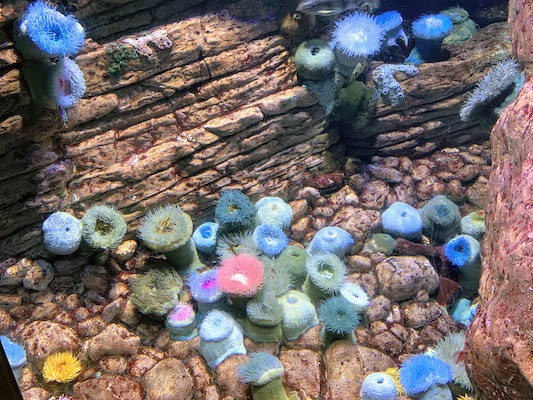
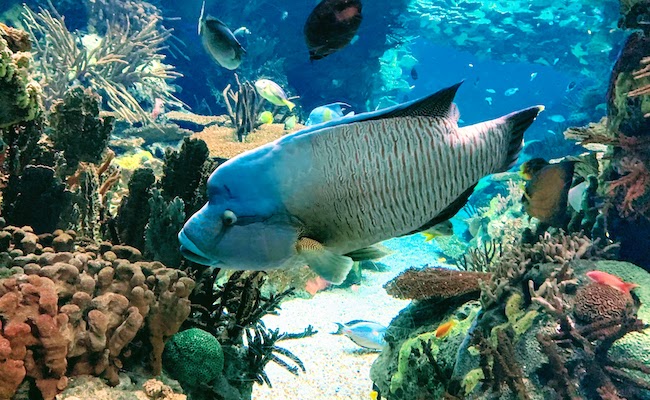
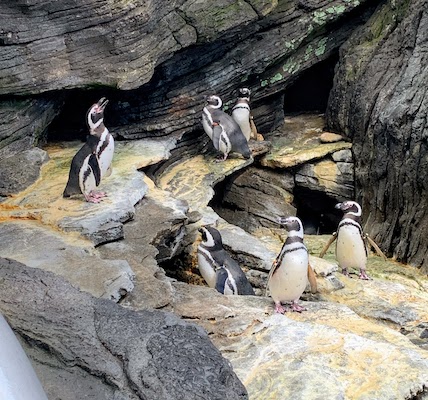
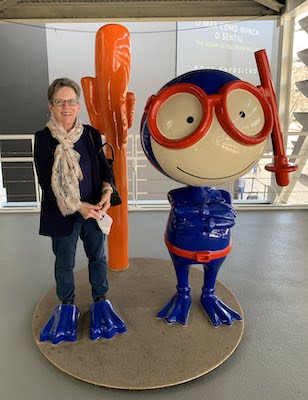
There were also educational exhibits, like this sculpture, which was created by the artists João Parrinha and Xandi Kreuzeder from 250 single flip flops that washed up on a beach in Cape Town, South Africa.
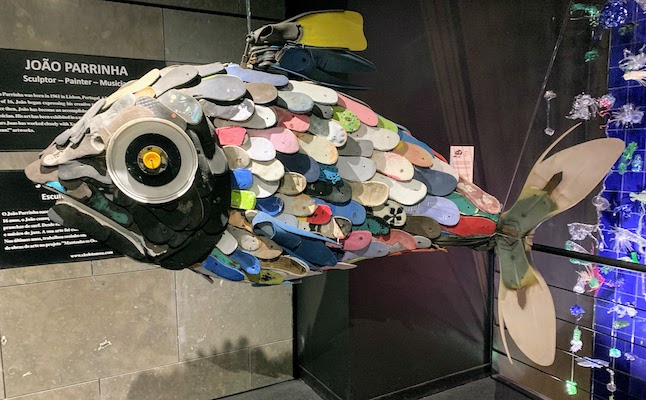
“Miss Flip Flop” was one of several installations from their project Skeleton Sea that focuses on the importance of keeping the oceans clean, and the importance of respecting nature and human rights. (They also created the sea monster outside the Oceánario.)
As we left, we saw a sign of how well social distancing is observed in Portugal.
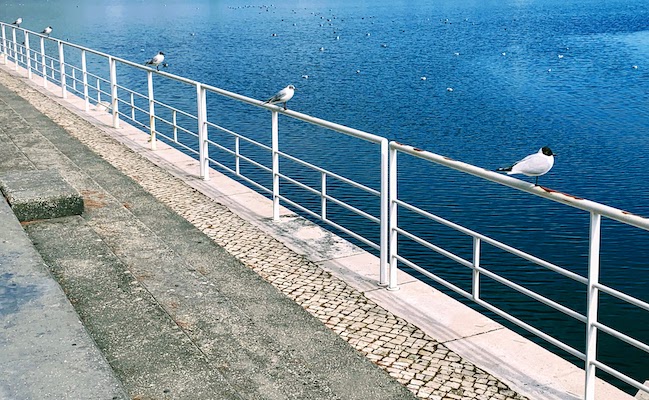
Innovative Architecture
We walked north from the Oceanário along a boardwalk that took us in front of the Pavilhão de Portugal – the Portuguese National Pavilion at Expo 98. It designed by the Portuguese architect and architectural educator Álvaro Siza Vieira.

A striking feature of the Pavilhão is the curved roof. From a distance, it looks like it might be made of cloth. But it’s actually made of concrete – a real feat of innovative engineering – and is attached to the structure with exposed steel cables.

In 2015 the Pavilhão was turned over to the University of Lisbon. It is now used as an event center, with an auditorium, exhibition rooms, offices, meeting rooms, and a restaurant.
Behind the Pavilhão are two apartment buildings – the Torre São Gabriel and the Torre São Rafael – that were named after two of Vasco da Gama’s Caravel sailing ships. Their design reflects the look of the ships.
Meeting Gil and the Big Kitty
Continuing our walk north, we came to the Rossio dos Olivais, a large open plaza with several interesting things to see.
First was Gil, the mascot of the Expo. He was named after Gil Eanes, a 15th century navigator and explorer.
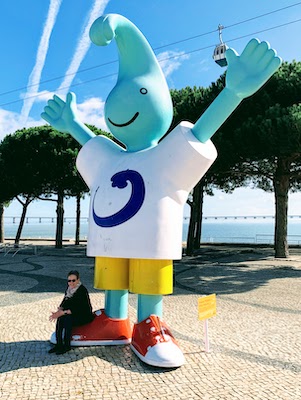
There was a long reflecting pool lined with the flags of the nations that participated in the Expo.
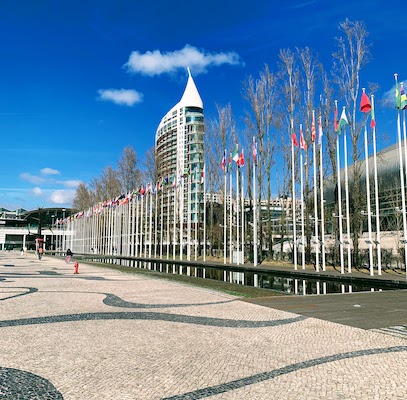
Just north of the plaza is the Altice Arena. It was originally named the Utopia Pavilion during the Expo and was the site of a large-scale multimedia show that was viewed by over 3 million people.
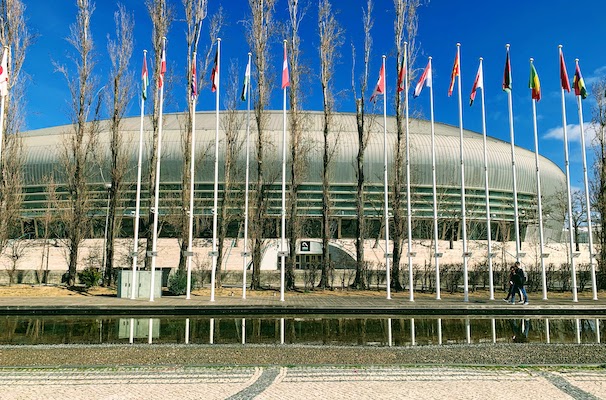
Today, the arena is used for concerts, conventions and other large-scale events.
At the west end of the plaza is a fantastic sculpture – the Lince Ibérico, or Iberian Lynx.

This large statue was made entirely of trash by the Portuguese sculptor Bordalo II. It was unveiled in June, 2019 at the conclusion of the Lisbon + 21 Conference that brought youth representatives from around the world to discuss topics related to the environment.
The real Iberian Lynx is an endangered species native to Portugal and Spain. It is now protected and its numbers are growing every year.
On Our Way Out
After seeing the Lynx, we walked west onto the Alameda dos Oceanos – a wide boulevard with lanes for vehicles and pedestrians. In the center median are benches and water features – the water volcanos – and some intriguing calçadas.
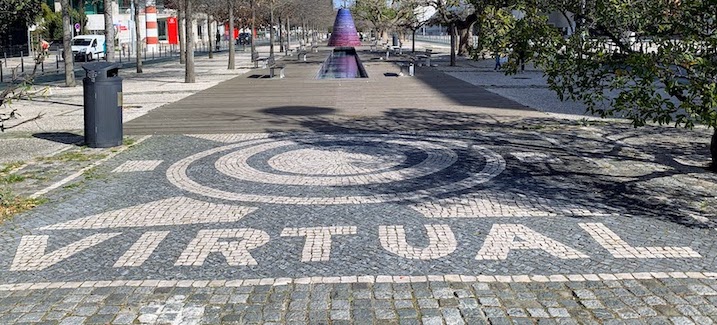

Along the Alameda, we saw the Casino Lisboa, which was originally the Future Pavilion at the Expo.
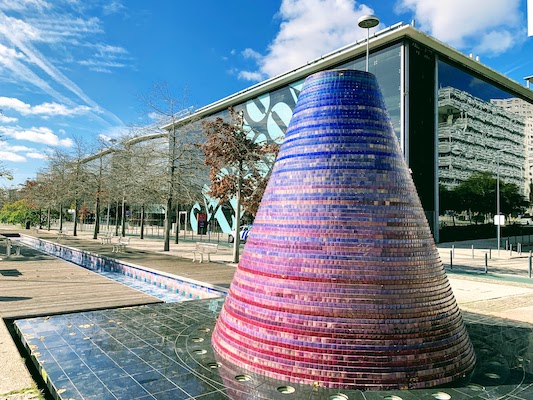
From there we walked to the Oriente metro station – a striking building that was the end point of the new line that was put in place for the Expo. We caught the metro there to ride across town to get to lunch.
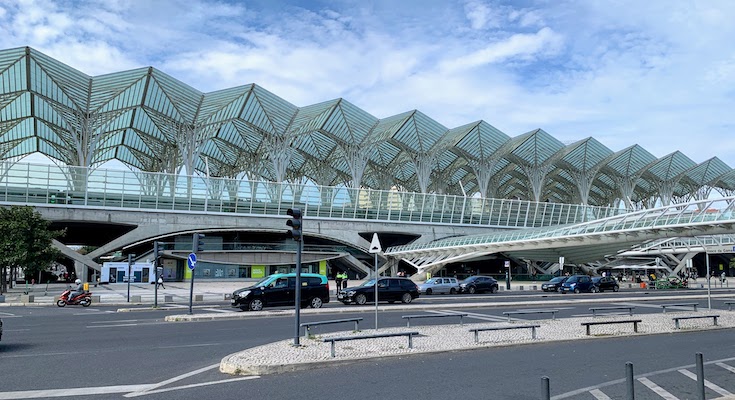
So Much to See!
There was more to the Parque das Nações than we were able to see in one day, so we’ll have to go back another time. The area is now a freguesia – a parish of Lisbon. It’s on our list of possible neighborhoods for our next move.
What new place have you explored lately? Tell us about it in the comments below or through a note using the Contact Us form. Your stories cheer us up.
Also, Mike has continued to update our new page, Perspectives on the war in Ukraine, with some additional news items from Portuguese and European sources.
Until next week / Até a próxima semana
Mary and Mike
The Cook and The Writer
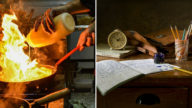


I really enjoyed vicariously spending the day at this park with you guys. So much interesting art and history and what a beautiful day! I’ve added Parque das Nações to the list of things to do and see in Lisbon once I finally get to Portugal and then to Lisbon.
I’ve never heard of this park — it looks like a wonderful space! Thanks for highlighting it for us.
Wow can’t wait to see this part of Lisboa when we arrive on two weeks. Thank you for this wonderful description of yet another part of the diverse city of Lisboa!
Today’s blog, SO interesting and a great read! Thanks! I’m impressed with the overall neat appearance of the Parques you visit. Do you see caretakers sweeping, picking up trash, and grooming the area constantly, or are the people of Portugal more caring of their environment than we in the U.S.?
Great read, very entertaining. Thanks so much for sharing your adventures.
Very Cool post!! We really enjoyed reading about your fun time in Lisbon and your interesting visit to the Expo. Felt like we were traveling along with you both! You look great Mary!! Safe travels and many more fun times ahead! Love, Sue & Eddie
What a great piece! I feel like I’ve gotten to travel today!
Take care and stay well,
Nan
Wow! It’s great that the park found continued use but still looks so new and not a “museum”. Looking forward to seeing you next month!